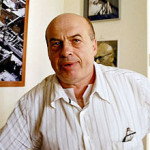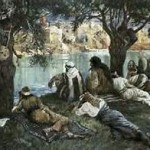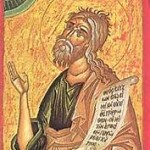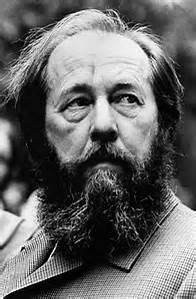When in suffering, there is a difference between
“biding one’s time” and “using one’s time.”
What do these names have in common?
Alexander Solzhenitsyn. Natan Sharansky.
Nelson Mandela. Martin Luther King Jr.
Each suffered in prison. Each was removed from others. Each was banished from their home.
 Political prisoners of any century mirror Judah’s plight of exile. Exiles are displaced, barred from returning to their homeland. In Judah’s case, God had promised the land (Gen 12.1-3), a land of abundance (Ex 3.8). God’s law, people, and Promised Land were declared inseparable through solemn ceremony (Deut 27; Josh 8).
Political prisoners of any century mirror Judah’s plight of exile. Exiles are displaced, barred from returning to their homeland. In Judah’s case, God had promised the land (Gen 12.1-3), a land of abundance (Ex 3.8). God’s law, people, and Promised Land were declared inseparable through solemn ceremony (Deut 27; Josh 8).
To be “a man without a country” is an awful experience.
 Exile also means probable mistreatment by indigenous peoples. Exiles have no standing in society. In some cases, exiles have to defend their own humanity. Exiles cannot always depend on another country’s laws. Finding work—having to leave one’s own calling behind—is a hardship. Ownership as an exile is difficult.
Exile also means probable mistreatment by indigenous peoples. Exiles have no standing in society. In some cases, exiles have to defend their own humanity. Exiles cannot always depend on another country’s laws. Finding work—having to leave one’s own calling behind—is a hardship. Ownership as an exile is difficult.
Exiles suffer in every conceivable way a person can suffer: physically, emotionally, spiritually, mentally, as well as vocationally.
Three times in the letter to Judah’s remnant in exile the word “shalom” is used (Jeremiah 29.4-7). In the context, those who are suffering continue to live life as best they can, benefiting the people and the culture around them. When in suffering, there is a difference between “biding one’s time” and “using one’s time.”
 The “remnant” (Jeremiah 31.7)—a small cadre loyal followers—is found throughout Scripture (Isaiah 2:1-4; 10:19-21; 19:19-25; 25:6-9; 56:3-8; 66:18-23). God’s promise is an eternal promise worked out through the remnant (33.14-26). There will always be a group of people who will continue God’s righteous line pleading for direction, for a course to follow (42.2). God’s desire is always pardon, always mercy (50.20).
The “remnant” (Jeremiah 31.7)—a small cadre loyal followers—is found throughout Scripture (Isaiah 2:1-4; 10:19-21; 19:19-25; 25:6-9; 56:3-8; 66:18-23). God’s promise is an eternal promise worked out through the remnant (33.14-26). There will always be a group of people who will continue God’s righteous line pleading for direction, for a course to follow (42.2). God’s desire is always pardon, always mercy (50.20).
God’s remnant in Judah keeps the hope of a whole nation. In like manner during reconstructive surgery, “preserving the remnant” of original organ, tissue, or ligature is important to bringing a patient back to full health. Often part of the process includes grafting other tissue to the original tissue. Doctors believe that by so doing, patients’ bodies will accept the procedure.
God’s Word has not failed because his promises will be fulfilled through the true remnant of Israel (Romans 9.6-29). The continuation of God’s people from Old to New Testament, from Hebrew to Christian, is the inclusion of all nations within God’s plan (Romans 16.25-27). The exiles of Judah form part of the remnant, making the reconstructive surgery of God’s people, possible.
 In the New Testament, Christians are also called “exiles.” Like Hebrews we are “aliens” and “strangers” in the earth (Ex 23.9; Lev 19:34; 25:3; 1 Pet 1.1, 2.11), a group of people committed to the God’s Word and God’s promises. Because we know what it is like to be an exile, we bear responsibility to grant care and protection to those outside the believing community (Lev 18.26; Deut 10.19; Mal 3.5; Gal 3.29; 6:9-10). Exiles suffer more than most. Israel’s past taught them how to treat others. Christians are given the same responsibility.
In the New Testament, Christians are also called “exiles.” Like Hebrews we are “aliens” and “strangers” in the earth (Ex 23.9; Lev 19:34; 25:3; 1 Pet 1.1, 2.11), a group of people committed to the God’s Word and God’s promises. Because we know what it is like to be an exile, we bear responsibility to grant care and protection to those outside the believing community (Lev 18.26; Deut 10.19; Mal 3.5; Gal 3.29; 6:9-10). Exiles suffer more than most. Israel’s past taught them how to treat others. Christians are given the same responsibility.
 Jeremiah ends with hope for exiles in the future. God had promised that He would give Israel a permanent kingdom (2 Sam 7.16; 1 Chr 7.14). Jehoiachin, the continuation of David’s royal line, the line of Messiah (Jer 23.1-8; 33.14-22), is released from prison (Jer 52.31-34). Hebrews 8:8-12 quotes Jeremiah 31:31-34 connecting Judah’s exiles to God’s fulfilled promise to David to the faithful remnant (Jer 23.3-5) in every generation. God never forgets His agreement, His promise, His commitment to His people.
Jeremiah ends with hope for exiles in the future. God had promised that He would give Israel a permanent kingdom (2 Sam 7.16; 1 Chr 7.14). Jehoiachin, the continuation of David’s royal line, the line of Messiah (Jer 23.1-8; 33.14-22), is released from prison (Jer 52.31-34). Hebrews 8:8-12 quotes Jeremiah 31:31-34 connecting Judah’s exiles to God’s fulfilled promise to David to the faithful remnant (Jer 23.3-5) in every generation. God never forgets His agreement, His promise, His commitment to His people.
Whether one’s name is Solzhenitsyn, Sharansky, Mandela, or King, exiles deeply feel their suffering. But God’s remnant have a hope surpassing all suffering: the Messiah will make all things right (Acts 3.21).
Dr. Mark Eckel’s contribution to Joni and Friends’ Beyond Suffering Bible (Tyndale, 2016) will be through the books of Jeremiah and Leviticus. Mark is president of The Comenius Institute and has just finished teaching a semester course on “suffering” at Crossroads Community Church, Fishers, Indiana.


